PREVIOUS
Recent Tamil Nadu Government Schemes – Part 1
(இதன் தமிழ் வடிவத்திற்கு இங்கே சொடுக்கவும்)
1.Mission Nature Scheme
Department: Education department of Tamil Nadu
Launched on: November 28, 2022.
Aim:
- The 'Mission Nature' scheme aims to improve the environmental awareness and activities in government schools, homes, and communities.
- The scheme focuses on practical environmental projects such as vegetable gardens, rainwater harvesting systems, waste management, plastic eradication, and awareness rallies.
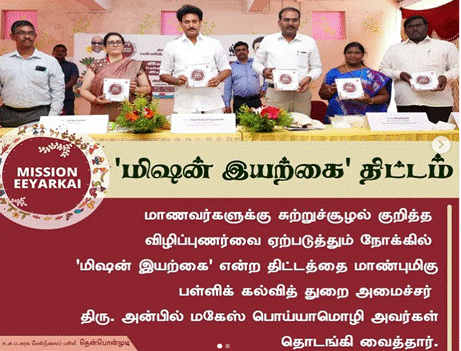
Nodal Agency:
- The scheme is managed by the Tamil Nadu School Education Department in collaboration with the World-Wide Fund for Nature India.
Beneficiaries:
- The primary beneficiaries of this scheme are students from 6,029 government schools equipped with advanced technology laboratories.
- These students will gain practical experience and knowledge in environmental conservation and sustainability.
Eligibility:
- The Government schools equipped with advanced technology laboratories are eligible to participate.
- Environmental teachers from these eligible schools must register their names.
- Each participating school must select five students to be involved in the scheme.
Activities:
- Participating schools will engage in various environmental activities including:
- Establishing vegetable gardens
- Implementing rainwater harvesting systems
- Managing waste effectively
- Eradicating plastic usage
- Conducting awareness rallies
- These activities will be documented through videos.
Awards:
- The best performing five schools and 25 students will be selected and awarded based on their participation and performance in the scheme.
2. Kalaignar Women's Rights Grant Scheme
Launched on:
- The scheme was launched on September 15, 2023, commemorating the birthday of C.N. Annadurai.
Aim:
- The Kalaignar Women's Rights Grant Scheme aims to provide financial support and empowerment to women in Tamil Nadu.
- It intends to improve the livelihoods and quality of life of women who are recognized as heads of households, thereby promoting gender equality and dignity in society.
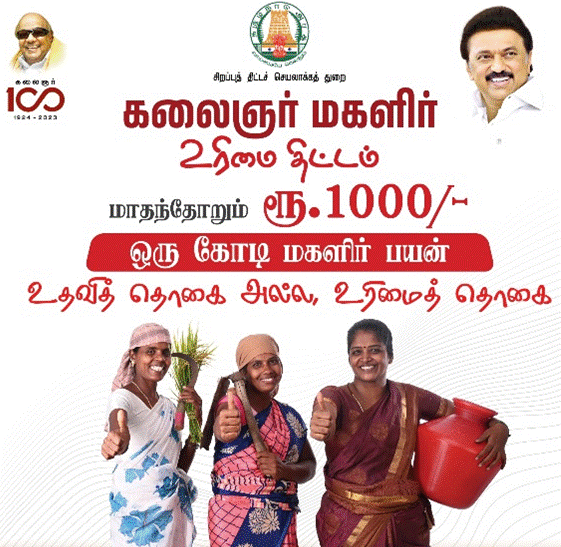
Ministry/Department:
- Implemented by the Government of Tamil Nadu under the leadership of Chief Minister M.K. Stalin.
Beneficiaries:
- Primary Beneficiaries: Women who are heads of households and registered beneficiaries.
- Secondary Beneficiaries: Unmarried single women, widows, and trans women running a household.
Eligibility Criteria:
- To qualify for the scheme, applicants must meet the following criteria:
- Age: Women must be born before September 15, 2002, and have completed 21 years of age.
- Household Status: Recognized as the head of the household on the family (ration) card. If not explicitly mentioned, any woman listed on the family card over 21 years old can be considered.
- Economic Criteria: The household must meet the following economic conditions:
- Annual income less than ₹2.5 lakhs.
- Own less than five acres of wetland or ten acres of dryland.
- Use less than 3,600 units of electricity annually for domestic purposes.
Key Features:
- Monthly Basic Income: ₹1,000 per month is provided as basic income to 10.6 million eligible women.
- Annual Grant: An additional ₹12,000 per year is granted to each eligible woman to enhance livelihoods and quality of life.
- Recognition and Rights: The scheme acknowledges the significant contributions of women in household and societal responsibilities, promoting their equal status in family matters.
Implementation:
- No separate income certificates or land records are required for application.
3.Green Tamil Nadu Mission
Launched on: November 28, 2022 Vandalur, Chengalpattu.
Aim:
- The Green Tamil Nadu Mission aims to significantly increase the forest and tree cover of Tamil Nadu to 33% of the state's land area.
- It focuses on ecological restoration, climate change mitigation, and enhancing biodiversity through large-scale tree-planting initiatives.
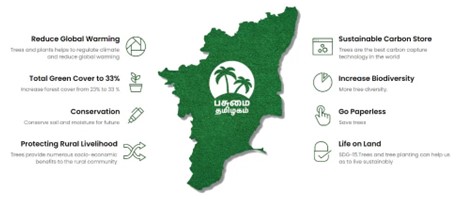
Ministry/Department:
- Initiated and overseen by the Environment, Climate Change, and Forest Department of the Government of Tamil Nadu under the leadership of Chief Minister M.K. Stalin.
Beneficiaries:
- Environment and Society: The entire population of Tamil Nadu benefits from improved air quality, water resources, soil fertility, and climate resilience due to increased forest cover.
- Local Communities: Including tribals, farmers, and rural people who benefit economically from sustainable forestry practices and the cultivation of economically valuable tree species.
Eligibility Criteria:
- The mission is inclusive and involves participation from various sectors, including government departments, public and private organizations, educational institutions, and local communities across Tamil Nadu.
Key Features:
- Tree Planting: Aims to plant 28 million saplings in the first phase and continues over a decade, focusing on native and economically significant tree species.
- Economic Empowerment: Encourages farmers to cultivate high-value trees like sandalwood, red sanders, and teak, thereby increasing income opportunities for local communities.
- Environmental Benefits: Addresses climate change impacts, natural disaster mitigation, and ecological restoration through enhanced forest cover and biodiversity.
- Technological Integration: Utilizes digital tools such as geo-tagging and a dedicated website (www.greentnmission.com) for monitoring sapling planting and survival rates.
Implementation:
- Partnerships: Collaboration among government departments, NGOs, private nurseries, and corporate entities like Hyundai India Motors and Manali Industrial Entrepreneurs Association for resource mobilization.
- Public Engagement: Educational exhibitions and community involvement to raise awareness and encourage active participation in greening efforts.
- Recognition: Acknowledges and rewards individuals and farmers excelling in tree-growing and greening activities to inspire broader community engagement.
4.Chief Minister's Thayumanuvar Scheme
Launched on: February 19, 2024.
Aim:
- The Chief Minister's Thayumanuvar Scheme aims to integrate and streamline all forms of government assistance to swiftly uplift approximately 500,000 extremely poor families out of poverty within the next two years.
- To provide relief and financial assistance to 5 lakh citizens of Tamil Nadu who are destitute, elderly living alone, single-parent families, orphan children, mentally handicapped individuals, and those in financial distress.
- The scheme aims to help these individuals come out of poverty, earn a living easily, and become self-reliant.

Ministry/Department:
- Implemented by the Government of Tamil Nadu, under the leadership and direction of the Chief Minister.
- A total of Rs 27,922 crore was allotted to this scheme by the Department of Rural Development and Panchayat Raj.
Beneficiaries:
- Extremely Poor Families: Approximately 500,000 families identified as living below the poverty line, comprising about 2.2% of the state's population as per the NITI Aayog report.
Target Groups:
- Destitute individuals
- Elderly persons living alone
- Single-parent families
- Orphaned children
- Persons with disabilities
Eligibility Criteria:
- Targeted towards families identified as extremely poor based on specific socioeconomic indicators and the poverty line criteria set by NITI Aayog.
- Residency: Applicant must be a permanent resident of Tamil Nadu.
- Groups: Applicant must belong to one of the following groups:
- Destitute
- Older People
- Orphaned children
- Single-parent families
- Persons with disabilities
Benefits
- Financial Assistance: Direct transfer of financial aid to the selected applicant’s bank account.
- Standard of Living: The scheme aims to improve the standard of living of the poorest families in Tamil Nadu.
- Poverty Reduction: The government aims to significantly reduce poverty in Tamil Nadu within 2 years through this scheme.
- Beneficiaries: More than 5 lakh individuals will benefit from this scheme.
Key Features:
- Integration of Assistance: Consolidates and delivers various government welfare schemes and benefits to ensure comprehensive support for poverty alleviation.
- Swift Upliftment: Aims to rapidly improve living standards and socio-economic conditions of identified vulnerable families.
- Focused Approach: Targets specific households identified as extremely poor to maximize impact and ensure effective poverty reduction.
Implementation:
- Identification Process: Utilizes data from the NITI Aayog report and other relevant sources to identify eligible families accurately.
- Comprehensive Support: Provides a range of support measures including financial assistance, social welfare programs, skill development initiatives, and access to basic amenities.
- Monitoring and Evaluation: Regular assessment of progress and impact to ensure effective implementation and achievement of poverty alleviation goals.
5.Chief Minister's Breakfast Scheme
Launched on: 15-09-2022, Chief Minister Breakfast Scheme was officially launched at Madurai by the Tamil Nadu Government.
Aim:
- The Chief Minister's Breakfast Scheme aims to provide nutritious breakfast to primary school students from Class 1 to Class 5 on all school days across Tamil Nadu.
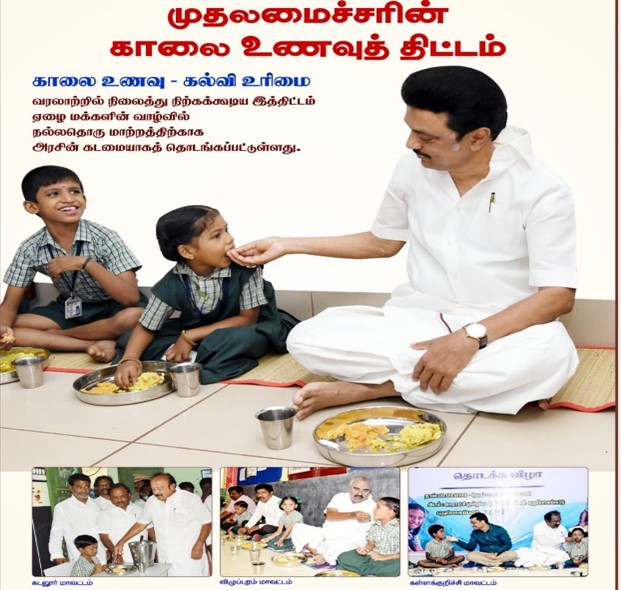
Ministry/Department:
- Implemented by the Government of Tamil Nadu, led by the Honourable Chief Minister.
- It comes under the ministry of Social Welfare & Women Empowerment Department.
Beneficiaries:
- Primary School Students: Specifically targeting students from Class 1 to Class 5 in government schools across Tamil Nadu.
Eligibility Criteria:
- All primary school students in government schools are eligible to receive the nutritious breakfast provided under this scheme.
Key Features:
- Nutritious Breakfast: Provides balanced and locally sourced meals to enhance the nutritional intake of school children.
- Targeted Distribution: Initially implemented in districts with high anaemia rates, remote rural areas identified through SBGF data, and regions with significant tribal populations.
- Health Benefits: Each breakfast includes essential nutrients such as energy, protein, fat, iron, and calcium, contributing to improved health and cognitive development.

- Budget Allocation: ₹33.56 crores allocated for the implementation of the scheme to ensure sustainable provision of nutritious meals.
Implementation:
- Phase-wise Rollout: Implemented in phases across different districts and schools based on specific criteria such as health indicators and demographic data.
- Menu Diversity: Emphasizes the use of locally available millets at least two days a week to promote dietary diversity and nutritional awareness.
- Monitoring and Evaluation: Regular monitoring of implementation to ensure quality, reach, and impact assessment on students' health and academic performance.
Expansion of the Breakfast Scheme
Launched on: 25.08.2023
Aim:
- The expansion of the Chief Minister's Breakfast Scheme aims to provide nutritious breakfast to a larger number of primary school students in government schools across Tamil Nadu.
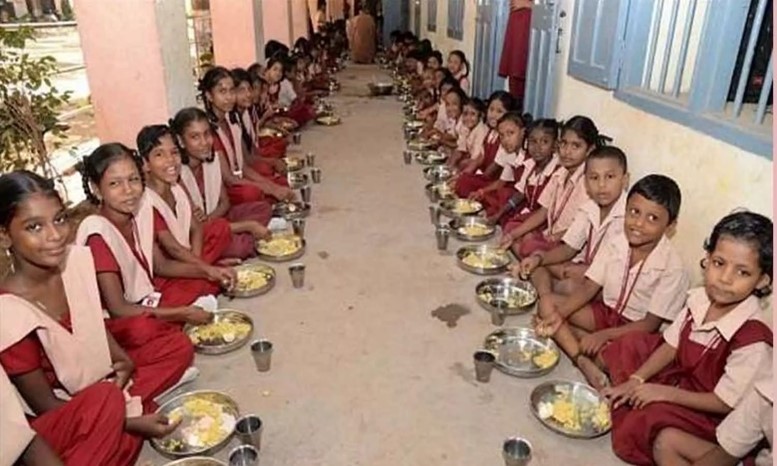
Ministry/Department:
- Implemented by the Government of Tamil Nadu, led by the Honourable Chief Minister M.K. Stalin.
- It comes under the ministry of Social Welfare & Women Empowerment Department.
Beneficiaries:
- Primary School Students: Approximately 1.7 million students studying in 31,000 government schools across Tamil Nadu.
Key Features of the Expansion:
- Increased Reach: Extends the benefits of the Breakfast Scheme to a significantly larger number of students compared to the initial phase.
- Universal Coverage: Ensures that students from diverse backgrounds and geographical locations in Tamil Nadu receive nutritious breakfast on all school days.
- Enhanced Nutritional Support: Continues to provide balanced meals including locally available millets to improve nutritional intake and address health challenges.
- Community Impact: Promotes health awareness and dietary diversity among students and their families, contributing to overall community health and well-being.
Implementation Details:
- Inauguration: Chief Minister M.K. Stalin inaugurated the expansion at Thirukkuvalai Union Middle School in Nagapattinam district, emphasizing the historical significance of the location.
- School Participation: Expansion covers 31,000 government schools, ensuring equitable access to nutritional support for students across Tamil Nadu.
- Continued Commitment: Demonstrates the government's ongoing commitment to prioritizing the health and well-being of school children through sustainable and inclusive education policies.
-------------------------------------


